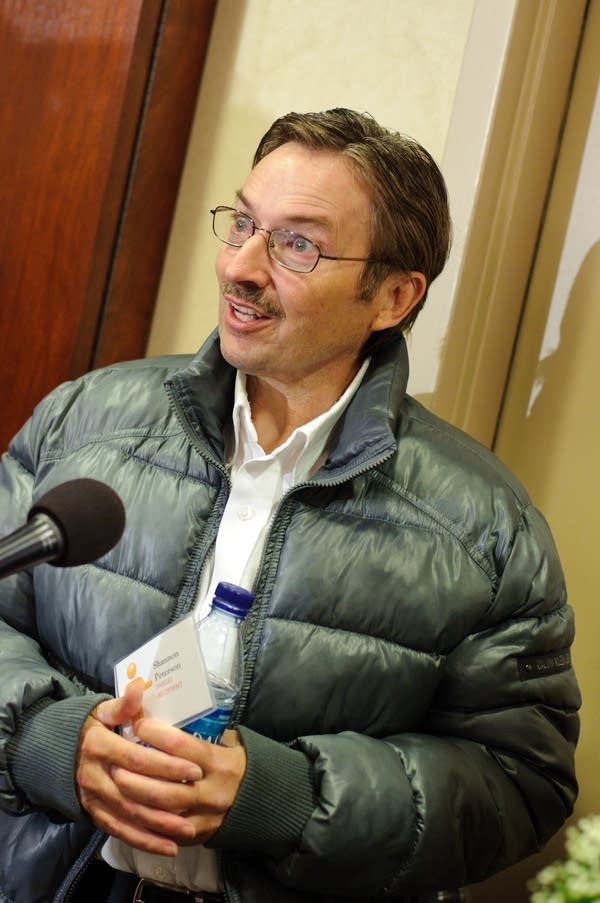Organ 'chain' donors, recipients meet for first time
Go Deeper.
Create an account or log in to save stories.
Like this?
Thanks for liking this story! We have added it to a list of your favorite stories.

Five kidney donors and their five organ recipients gathered at a Minneapolis hospital Tuesday for their first face-to-face meeting, four months after participating in a unique chain of transplant surgeries known as a paired donor exchange.
Some traveled from as far as North Dakota to take part in the festive luncheon. Many brought along their grateful children and loved ones.
The "kidney chain" started when Nicholle Hayes, a 34-year-old married mother of four, contacted the University of Minnesota Medical Center, Fairview.
Hayes, of Bloomington, told the U that she was willing to donate one of her kidneys to anyone who need it.
Turn Up Your Support
MPR News helps you turn down the noise and build shared understanding. Turn up your support for this public resource and keep trusted journalism accessible to all.
Hayes said she was already well aware of the desperate need for donor kidneys. The wait for a donor kidney is often years long. Her husband's uncle had died the previous year while waiting for a kidney.
"We can live fine on one kidney and I've got two," Hayes said. "I'm healthy and there's people waiting. There's so many people waiting."
Her gift was a welcome answer to Shannon Peterson's prayers. Peterson, 50, of Minot, North Dakota, had been on dialysis for a year and a half while waiting for a cadaver kidney. Peterson was very sick, and he knew the odds of finding a kidney were not in his favor because of his blood and tissue type.

"She didn't have to do it. She just did it out of the kindness of her heart," said Peterson. "Unbelievable. Can you imagine somebody doing that?"
The transplant success story might have ended there, if Peterson hadn't signed up for a matched donor exchange program through his hospital, Sanford Health Medical Center in Fargo.
By joining the donor exchange pool, Peterson agreed to recruit another kidney donor in exchange for the kidney he would receive. His sister Sheila Dalen, 52, eagerly agreed to be his exchange donor.
At Tuesday's luncheon, Dalen met the man who received one of her kidneys. He's a 52-year old Minneapolis man named Mark, who did not want to reveal his last name.
Mark and Sheila are excited to meet each other, and when they do they exchange a long hug. Sheila Dalen describes the moment as overwhelming.

Mark also brought a donor to the exchange, a friend named Ann. Ann gave one of her kidneys to Pricilla. Pricilla's donor partner, John, then gave a kidney to Robert. And Robert's donor Heather gave one of her kidneys to Matthew.
All of them attended the reunion lunch at Abbott Northwestern Hospital, one of the three hospitals where the transplants took place.
Some of the donors and recipients said they hope their stories will convince other potential kidney donors to consider doing what Nicholle Hayes did.
Hayes says that's her hope too. But she knows it's not for everyone.
"I can't fault anybody for being afraid of surgery or what could happen. That was the big question, what happens if your other kidney fails?" said Hayes. "Well, it's just probably not going to. That doesn't happen real often."

Hayes says her surgery was very easy. She took two weeks of paid vacation time to recover, and then she worked from home for a short while longer. All of her medical expenses were covered by her recipient's insurance plan.
"If I could stop and do this, a full-time working mom of four, it's not hard. It just wasn't hard to do," she said.
Catherine Garvey, clinical director of the transplant office at the University of Minnesota Fairview, says it is an extraordinary decision to willingly give a kidney to someone you don't know. In the past 10 years, the university has only cleared 62 people to give these types of non-directed donations.
"These donors are amazing people. They'll do anything. And most of them are just motivated by trying to help someone else," said Garvey. "So they'll sit in an exchange and wait until a match comes. A lot of people can't do that. I think it's just that one unencumbered patient or donor that can make some things happen."
Non-directed kidney donations are often the catalyst that can set off a chain of transplants. So even if transplant programs never attract great numbers of eager recruits, they can make the most of the donations they do receive, by plugging them into paired donor exchanges.
Some estimates have suggested that if the exchanges were implemented nationwide, an additional 2,000 people might be able to get kidney transplants each year.
Dear reader,
Political debates with family or friends can get heated. But what if there was a way to handle them better?
You can learn how to have civil political conversations with our new e-book!
Download our free e-book, Talking Sense: Have Hard Political Conversations, Better, and learn how to talk without the tension.






